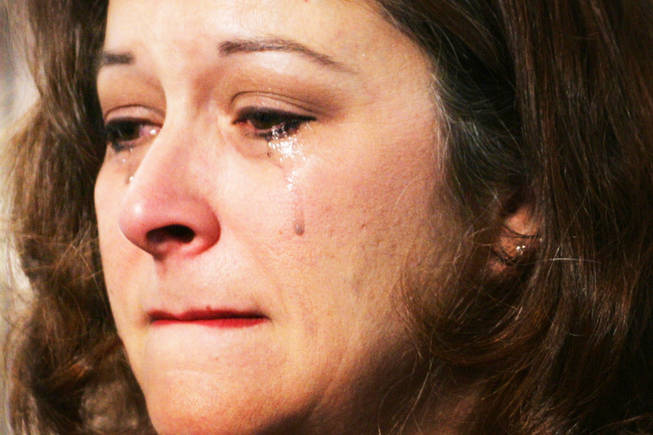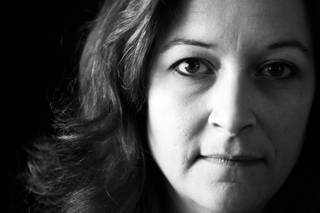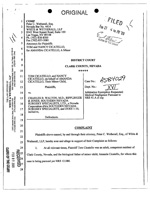
Maria Hoshal recalls the pain her mother, Carol Ann Doyle, suffered after laparoscopic surgery to remove her gall bladder. Her mother died seven days after the surgery.
Sunday, Sept. 19, 2010 | 2 a.m.
Do No Harm: Maria Hoshal
On Nov. 6, 2006, Maria Hoshal's mother, Carol Ann Doyle, had her gall bladder removed at a local hospital. Doyle died eight days later from sepsis.
Do No Harm: Hospital Care in Las Vegas, Part 3
- Patients at risk under the knife
- Routine surgery, harrowing result
- A cry for help
- Doctors avoid discipline
- Colorado transparency unique
- Last drumroll
- How the Sun identified surgical injuries
Share your stories
Among Carol Ann Doyle's last words was an anguished cry that "something was backwards" inside her.
Dr. Gregg Ripplinger had warned Doyle that she would be in some pain after laparoscopic surgery to remove her gall bladder.
But soon after the surgery, which took place on Nov. 6, 2006, at St. Rose Dominican Hospital — Rose de Lima Campus, it was obvious to Doyle and her family that something was wrong. The active 70-year-old, who stayed busy following the lives of her 14 grandchildren and the Las Vegas Wranglers hockey team, should have been up and walking after the procedure. Instead, she was doubled over on the couch in the fetal position, according to her daughter, Maria Hoshal.
On Nov. 7, Doyle returned to the St. Rose emergency room, according to a lawsuit her family has filed, where she saw Dr. Lyn Knoblock, Ripplinger's partner. Knoblock dismissed Doyle's complaints, Hoshal said. "She flat out told her, 'She's not having any pain. You're not really feeling any pain, dear.' "
Knoblock prescribed more pain medication, though. And the family dutifully gave Doyle her antibiotics and painkillers, as instructed. But nothing worked.
Leann Sanders, attorney for St. Rose, disagreed with Hoshal's depiction of the hospital visit. She said in an e-mail that the hospital provided appropriate treatment to Doyle — ordering diagnostic studies and lab work and arranging to have her admitted.
"We believe that the physician acted well within the applicable standard of care in the treatment provided to Mrs. Doyle," Sanders said.
Knoblock and Ripplinger did not return requests for comment for this story.
Concerned, the family called Ripplinger's office. On the fourth day after the surgery, the family said Ripplinger examined Doyle and told them that her pain was normal.
Back home, Doyle remained in bed. The short walk to the bathroom took about an hour, Hoshal said.
Within two days, Doyle could no longer move. She told her family that "something was backwards" in her gut.
According to court records, Doyle's family called the doctor's office again and was instructed to give her more Lortab, a common narcotic painkiller. Doyle began hallucinating.
The next day, Sunday, Nov. 12, Doyle couldn't speak and was taken by ambulance to Spring Valley Hospital. A CT scan revealed her insides were filling with bile, a yellow-green fluid produced by the liver that helps digest fat.
"She's the sickest woman in the hospital right now and that's saying a lot," a doctor warned the family.
Doyle was rushed into surgery, where the doctor cleaned out the bile. The family claims they were told that either a misplaced or wrong-size clamp was used during her gall bladder surgery. As a result, the cystic duct had leaked bile into her abdomen. Doyle was poisoning herself. She was septic.
Doctors at Spring Valley didn't explain how the problem with the clamp had occurred, and Hoshal said the family was too stunned to probe.
They went home late that night, only to be called back to the hospital at 3 a.m. to say their final goodbyes to Doyle.
Hoshal said she had urged her mom to fight for her life. But after seeing all the suffering, Hoshal said her final words to Doyle were that it was OK to let go, that she loved her and would always love her.
An autopsy determined Doyle's death was accidental, caused by peritonitis — an infection of the membrane that lines the inner abdominal wall — resulting from a leak at the laparoscopic cholecystectomy site.
Hoshal said that at the time she thought her mother's death was a freak accident.
More than a year later, Hoshal met a nurse at a Christmas party and told her about her mother.
"Death is not a normal conclusion for laparoscopic gall bladder surgery," the nurse said. "The amount of pain she was in, somebody should have run a test."
Until then, it hadn't occurred to Hoshal that her mother's death might have been preventable.
In early 2008, Hoshal and her sister pulled the records from St. Rose and Spring Valley, and found the doctor's note about the clamp either coming loose or being improperly placed. She was stunned.
The light bulb went on, she said. "Somebody made a mistake and didn't catch it or didn't fix it and should have."
Doyle had raised her children to respect authority and the abilities and opinions of experts. Hoshal said she regrets accepting the opinions of Ripplinger, Knoblock and others at the St. Rose emergency room with "blind faith."
"You put your faith in your doctor, and to have your faith abused to the point where death is the result is very disheartening," Hoshal said. "We did what we thought we were supposed to do."
The family is suing Ripplinger, Knoblock and St. Rose, hoping that their mother's death can bring changes that will protect other patients.
Hoshal doesn't want Ripplinger to lose his license, but does want him to pay more attention and take more time with patients.
"It's a frightening thought that it may not have even penetrated his consciousness that there was a mistake made that was correctable and should have been corrected," she said. "He's got people's lives literally in his hands on a daily basis. That's a huge responsibility and you need to be able to be up on that responsibility and take ownership of that."




Join the Discussion:
Check this out for a full explanation of our conversion to the LiveFyre commenting system and instructions on how to sign up for an account.
Full comments policy